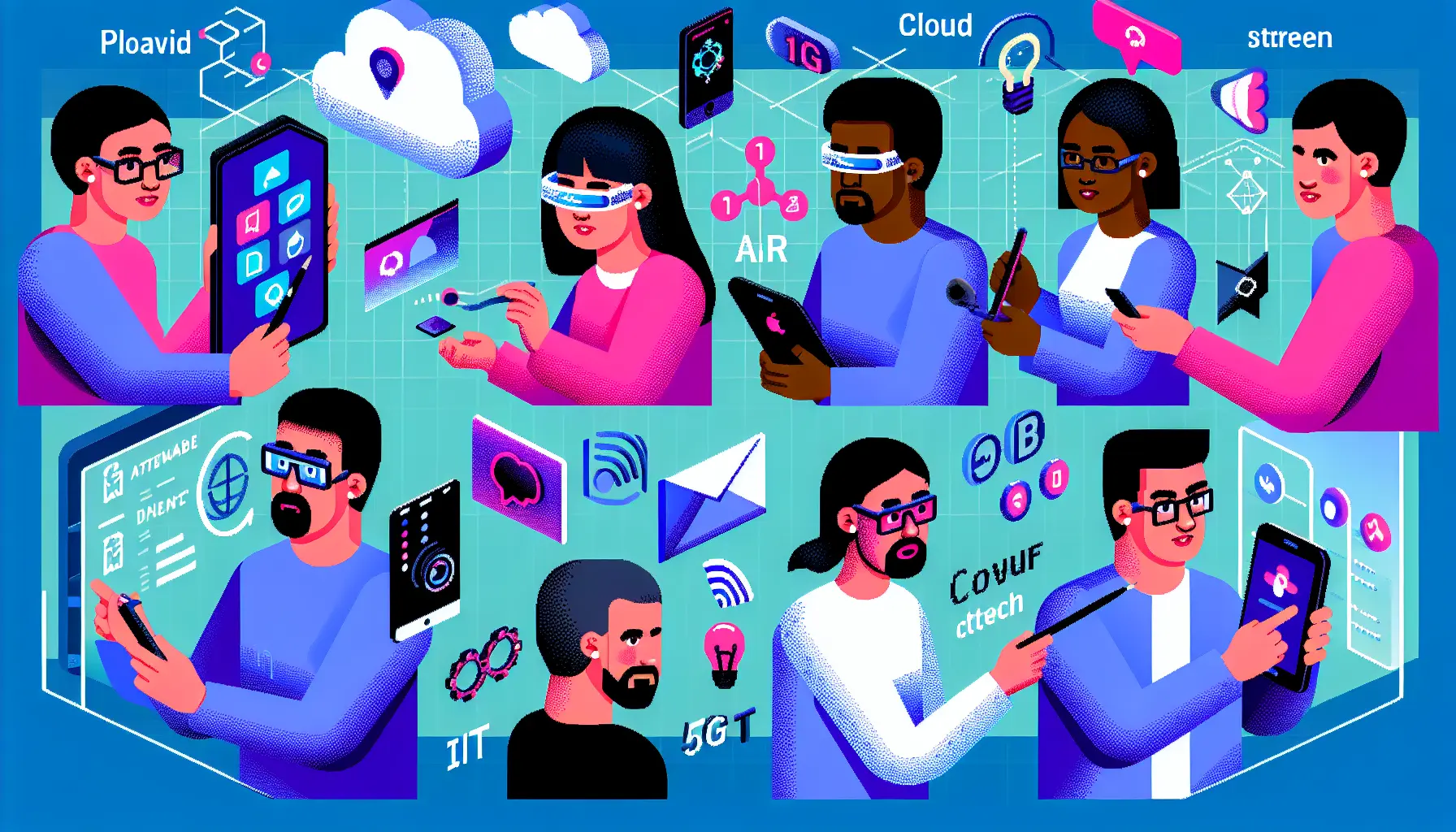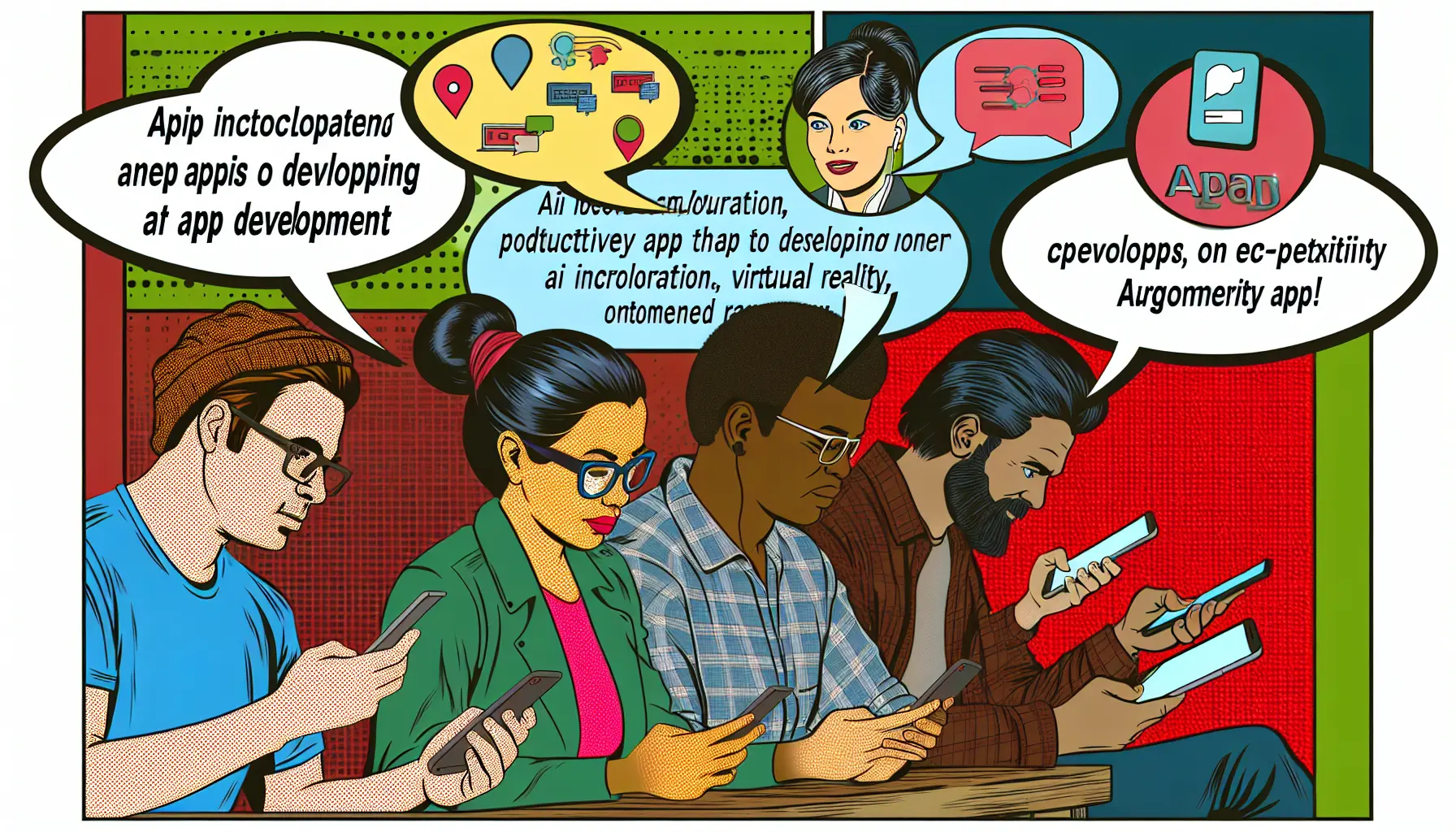Here’s a reworded version of the paragraph:
Trends Shaping Mobile App Development
The mobile app development space is in a state of constant flux, influenced by rapid technological progress, shifting user preferences, and creative business strategies. To remain competitive, developers and businesses must stay attuned to these trends and adapt to meet evolving user needs. By grasping the effects of trends on market dynamics and consumer behavior, app creators can optimize their development and deployment efforts for success.

User Experience and Interface Design Trends
User experience (UX) and interface design play a pivotal role in the success of mobile apps. Staying attentive to the latest trends in this area helps ensure that apps meet the expectations and preferences of users.
Simplification and Minimalism
Mobile apps are increasingly prioritizing simplicity and minimalism in their design to enhance usability and streamline the user experience.
Personalization and Customization
Personalized app experiences tailored to individual user preferences are becoming increasingly popular, allowing for more engaging and relevant interactions.
Voice-Enabled Interfaces and Gestural Navigation
The integration of voice-enabled interfaces and gestural navigation is gaining traction, offering users new and intuitive ways to interact with mobile apps beyond traditional touch-based inputs.
These design trends are shaping the way users engage with apps, emphasizing the need for seamless and personalized experiences that cater to individual preferences and behaviors. Keeping abreast of these trends enables developers to create apps that resonate with modern users

The Rise of AI and Machine Learning
AI and machine learning are revolutionizing the mobile app landscape, offering new capabilities and opportunities for developers to enhance user experiences and app functionality.
Predictive Analytics and User Behavior
AI enables predictive analytics that help in understanding and predicting user behavior, enabling apps to offer personalized experiences and targeted content to users.
AI-Powered Chatbots and Virtual Assistants
Intelligent chatbots and virtual assistants driven by AI and machine learning are increasingly integrated into mobile apps to provide efficient and personalized interactions with users.
Machine Learning for Real-Time Problem-Solving
The integration of machine learning algorithms in mobile apps enables real-time problem-solving, providing users with immediate and context-aware solutions and recommendations.
The integration of AI and machine learning in mobile apps is reshaping the way users interact with applications, fostering more personalized and intelligent experiences. Keeping abreast of these advancements can empower developers to create apps with enhanced functionality and user engagement### Augmented Reality (AR) and Virtual Reality (VR) Applications
The integration of AR and VR technologies in mobile apps is providing immersive and interactive user experiences, transforming gaming, education, training, and visualizations.
Wearables and IoT Devices
Mobile app development is increasingly focused on seamless integration with wearables and IoT devices, allowing for synchronized functionality across different platforms and devices.
Mobile Payment Integration and Wallet Apps
The integration of secure mobile payment methods and digital wallet apps is becoming increasingly prevalent, facilitating convenient and secure financial transactions within mobile apps.
Advancements in hardware integration are driving the evolution of mobile app capabilities, offering users enhanced experiences and functionality. Staying informed about these trends is imperative for developers seeking to leverage these advancements in their app development initiatives

Emerging Frameworks and Tools
The trend towards cross-platform app development is being facilitated by the emergence of powerful frameworks and tools such as React Native, Flutter, and Xamarin, enabling developers to build applications that run seamlessly across multiple platforms.
The Benefit of Unified Codebases
By leveraging cross-platform development, developers can maintain a single codebase for multiple platforms, streamlining the development process and reducing maintenance efforts.
Performance and Native Experience
Advancements in cross-platform development technologies have led to significant improvements in performance and the ability to deliver a native-like user experience, blurring the lines between cross-platform and native app development

Data Encryption and Safe Storage
As the amount of sensitive user data collected by mobile apps continues to grow, the focus on data encryption and secure storage mechanisms becomes paramount. Implementing robust encryption algorithms and secure storage protocols helps protect user data from unauthorized access.
Biometric Authentication Methods
Mobile app developers are increasingly leveraging biometric authentication methods, such as fingerprint recognition and facial recognition, to enhance the security of their applications and provide a more seamless user experience.
Increased Regulations and Compliance
Developers must remain attentive to evolving data privacy regulations and compliance standards, such as the General Data Protection Regulation (GDPR) and the California Consumer Privacy Act (CCPA), and ensure that their apps adhere to these regulations to safeguard user privacy and avoid legal repercussions

Apps for Social Change and Sustainability
Mobile apps are being developed to address pressing societal and environmental issues, promoting social change, sustainability, and corporate social responsibility. These apps aim to raise awareness, support sustainable practices, and facilitate social impact initiatives.
Accessibility Features and Inclusive Design
Developers are placing greater emphasis on creating apps with inclusive design principles, ensuring that their apps are accessible to users with disabilities. This includes features such as screen readers, voice controls, and other accessibility tools to accommodate a diverse user base.
Ethical Considerations in App Development
App developers are increasingly factoring in ethical considerations in their development process, such as ensuring transparency in data usage, respecting user privacy, and adhering to ethical guidelines for content and interactions within the app. This ensures that apps are developed and maintained in an ethical and socially responsible manner

Subscription Services and In-App Purchases
Mobile app developers are increasingly adopting subscription-based models and offering in-app purchases, providing users with added features, content, or functionality through premium subscription tiers or one-time purchases.
Freemium Models and Premium Features
Freemium models, which offer basic features for free while charging for premium features or content, are gaining popularity. This allows users to experience the app’s core functionalities before opting for additional paid features.
Advertising and Partner Integrations
Many developers monetize their apps through ad revenue by integrating ads from ad networks or by partnering with other businesses and platforms. This includes sponsorships, collaborations, and affiliate marketing, providing an additional revenue stream

Faster Speeds and Reduced Latency
The rollout of 5G technology brings remarkable improvements in mobile data speeds and reduced latency, contributing to faster loading times and smoother app performance. This enhanced speed enables the development of more data-intensive applications and seamless user experiences.
Enhanced Streaming and Media Consumption
With the advent of 5G, mobile apps can provide higher quality media streaming experiences. This technology enables developers to create apps with the capability to deliver higher-resolution video content, smoother streaming, and faster downloads.
Opportunities for Innovation in App Functionality
The increased speed and reduced latency facilitated by 5G offer new opportunities for innovative features and functionality within mobile apps. Developers can explore immersive augmented reality experiences, real-time multiplayer gaming, and high-fidelity video calling, all made possible by the capabilities of 5G technology#### Staying Educated on New Technologies and Practices
In the rapidly evolving landscape of mobile app development, staying abreast of new technologies, best practices, and industry developments is essential for developers. Professional development through online courses, workshops, and industry events can provide valuable insights and skills necessary for creating innovative and competitive mobile apps.
Implementing Agile Development and Continuous Delivery
Embracing agile methodologies and continuous delivery processes allows developers to adapt to changing requirements, release updates more efficiently, and respond to user feedback promptly. This iterative approach fosters a culture of collaboration, adaptability, and rapid development cycles.
Collaborating with Stakeholders and End-Users
Engaging with stakeholders and end-users throughout the development lifecycle is crucial for understanding user needs, gathering feedback, and ensuring that the app aligns with business objectives. Collaboration paves the way for user-centric design and functionality, resulting in mobile apps that effectively address market demands and user preferences

Certainly! Below are the detailed answers to the frequently asked questions:
What Marketing Strategies Are Effective for Modern Mobile Apps?
Effective marketing strategies for modern mobile apps often include a combination of digital marketing techniques such as app store optimization (ASO), targeted social media campaigns, influencer partnerships, content marketing, and search engine optimization (SEO). Additionally, utilizing data analytics and user feedback to refine marketing strategies is crucial for engaging with the app’s target audience.
How Can Developers Ensure App Accessibility for All Users?
Developers can ensure app accessibility for all users by following inclusive design principles, adhering to accessibility standards such as WCAG (Web Content Accessibility Guidelines), incorporating features like screen readers, voice control, and magnification, and conducting thorough testing with a diverse user base. Prioritizing accessibility enhances user experience for all users, including those with disabilities.
Are Mobile Apps Shifting More Towards Cloud-Based Services?
Yes, there is a noticeable shift towards cloud-based services in mobile app development. Cloud computing offers scalability, enhanced security, and accessibility, making it an attractive option for app developers. Cloud services also facilitate seamless integration of data and functionalities across multiple devices, providing a consistent user experience.
Which Programming Languages Are Trending in Mobile App Development?
Currently, programming languages such as Kotlin for Android app development and Swift for iOS app development are trending due to their modern features, performance optimizations, and developer-friendly syntax. Additionally, languages like JavaScript, particularly for hybrid app development, and Dart (Flutter) for cross-platform app development are gaining popularity for their versatility and robust community support
